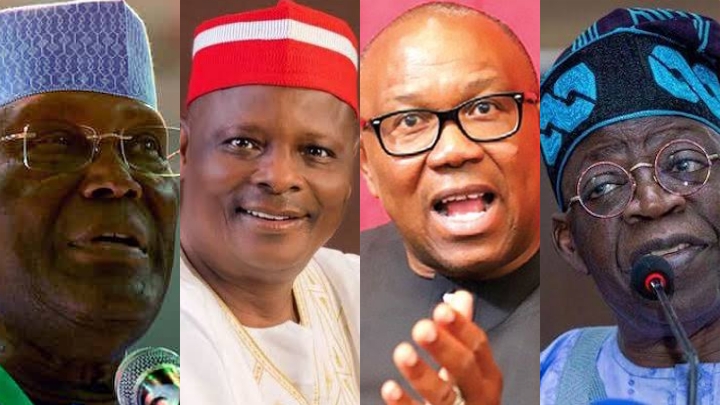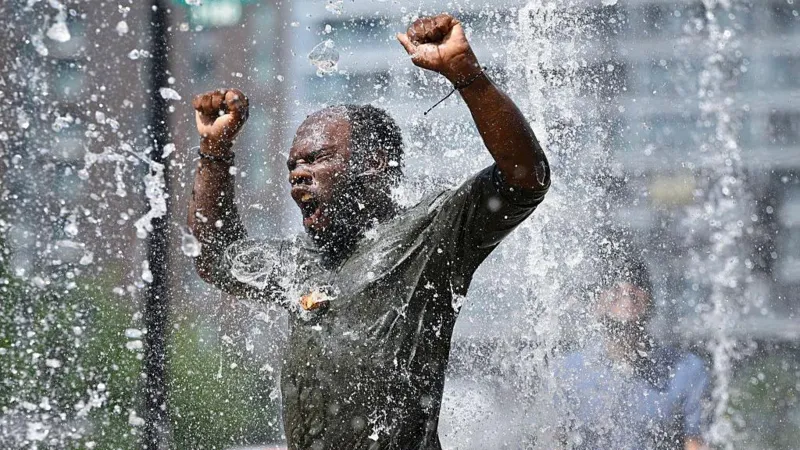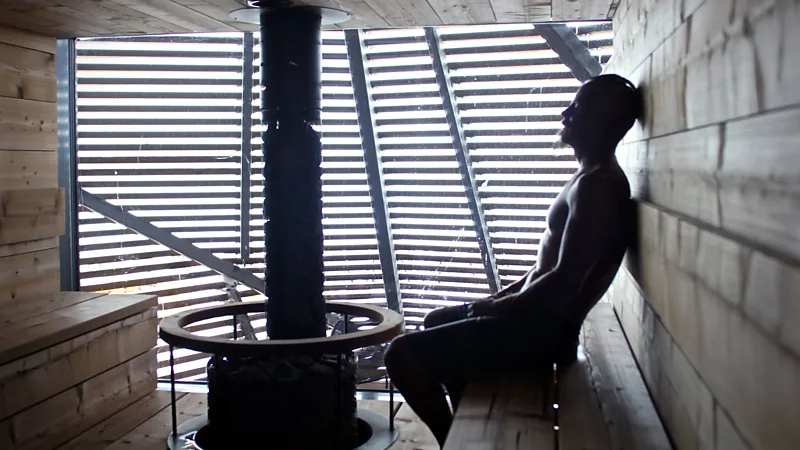Nigeria election 2023: Five reasons to care about the vote
Millions of Nigerians are set to elect their next president. Here’s what’s at stake.

Africa’s largest democracy will hold its presidential election on Saturday.
As many as 93.4 million registered voters will determine who gets to be the next president of the continent’s most populous country. They will also decide the composition of the two chambers of Nigeria’s parliament.
There are four frontrunners among the 18 presidential candidates: Ahmed Bola Tinubu of the ruling All Progressives Congress; Atiku Abubakar of the main opposition force, the People’s Democratic Party; Rabiu Musa Kwankwaso of the New Nigeria People’s Party; and Peter Obi of the Labour Party.
Here are five issues that have dominated the lead-up to this pivotal election:
Security
Outgoing President Muhammadu Buhari, a former general with war experience, took office in 2015 after promising to tackle insecurity, especially in the northeast, where Boko Haram has been waging a bloody armed campaign since 2009.
But his attempts have hardly been successful.
Instead, multiple armed groups – including most notably Boko Haram’s offshoot, the Islamic West African Province – are prowling the northern hinterlands.
Nigeria is also in the throes of a kidnapping epidemic, an increasingly worrying crime wave perpetrated by gangs of armed bandits, especially in the northwest and central Nigeria. In the southeast, meanwhile, cries of political and economic marginalisation have propelled the rise of separatists whose campaigns have turned violent.
Electoral commission offices have also been attacked in recent months, leading some to speculate that the vote may be rescheduled.
With each of the frontrunners promising security reforms, many Nigerians hope that a new president could help stem the tide of violence and instability.
Economy
Millions of people in oil-rich Nigeria have seen their purchasing power decline as the country’s currency, the naira, has plummeting to a third of its value in 2015.
Africa’s largest economy has multiple exchange rates to the United States dollar with the black market rate almost double the official one.
That is partly due to low oil production because of massive crude theft in the Niger Delta region as well as a fuel subsidy regime that civil society leaders and even government officials say has encouraged a tide of corruption.
Ahead of the election, there have been cash and fuel shortages nationwide as the central bank introduces new banknotes.
Investors are hoping for the entry of a business-friendly government to reduce bureaucracy in Nigeria, which is ranked 131 out of 190 economies on the World Bank’s Ease of Doing Business index.
Dissatisfaction of young people
Experts say a democratic renaissance is under way in Nigeria, which has the world’s largest youth population and a median age of 18 years. Young people are a demographic group that has typically been associated with voter apathy, but in this election it seems set to make its voice heard.
More than a third of voters – approximately 37 million – are aged 18 to 34, and there is a sense that the passion that helped propel the Afrobeats music genre and the Nollywood film industry into globally renowned art powerhouses is now being focused on politics.
Some of the youth’s grievances with the current administration include a seven-month Twitter ban, an eight-month strike at public universities and the killing of more than a dozen protesters by the military at a youth-led anti-police brutality protest in 2020.
“The plight of the youth is compounded by a failing education system and burgeoning unemployment,” Oluwole Ojewale, an analyst at the Institute for Security Studies, told Al Jazeera. “It’s not surprising to see the demographic cohorts mostly affected becoming politically conscious to drive a change.”
That anger has contributed to “Japa wave”, a Nigerian phrase for immigration, as many skilled workers flee the country for safety and better jobs.
But it has also crystallised into rousing support, particularly on social media, by some young people for Obi, an outsider seen by his supporters as a rare “principled” politician.
“Considering the moneybag nature of Nigeria politics, which has made electioneering an uphill task for any candidate outside the establishment parties, it remains to be seen how the social media campaign driven by the young population will translate to electoral victory for their preferred candidate in this election,” Ojewale said.
A change of guard
For the first time since Nigeria’s return to democracy in 1999, this will be the first election that a former general will not be on the ballot.
Three of the four frontrunners and at least two other contenders first gained national relevance in the 1993 election, widely seen as the “freest and fairest” in the country’s history but annulled by the military. This has led analysts to describe Saturday’s vote as a changing of the guard – just not to a youthful crew.
Indeed, while advocates say youth participation in the vote is on course to reach record highs, only a few elected positions in Nigeria are occupied by young people.
Until 2018, Nigerians under the age of 30 could not run for state or federal office and had to wait until they were 40 to attempt a presidential run.
Even though this change is beginning to reflect on the ballot, that is happening only for lower offices.
About 411 candidates are involved in the 28 governor races, which will be decided on March 11; 115 of them are in their 40s and 53 are in their 30s.
Obi, the youngest of the four presidential frontrunners, is 61 and the only one born after independence from Britain in 1960.
Geopolitics
As Nigeria deals with its internal crises, there is also a crisis of confidence in democracy across West Africa. In the past three years, a series of coups and attempted coups in its neighbours Burkina Faso, Guinea, Guinea-Bissau and Mali have led to the region being called the “coup belt”.
Several former African presidents have travelled to Nigeria ahead of the vote to serve as heads of foreign observer missions. They include South Africa’s Thabo Mbeki, Sierra Leone’s Ernest Bah Koroma, Malawi’s Joyce Banda and Ghana’s John Mahama.
Civil society leaders and experts say Nigeria is being perceived as a stabilising force in West Africa and another successful civilian-civilian transition would be key to establishing its influence in the region for good.
“Nigeria stands to become a beacon for Africa but also stands the risk of bringing darkness to the continent because whatever happens will have great repercussions across the continent and also the impact will be felt around the world, ” said Stanley Achonu, Nigeria country director for ONE.org, a campaign to end extreme poverty and preventable disease.
For that to happen, the elections – Nigeria’s seventh successive vote since the return to democracy – have to be credible and the country’s election commission needs to be seen as an impartial umpire, observers said.
“The gaze of 210 million Nigerians, 1.3 billion Africans and 2.5 billion members of the Commonwealth are on the Nigerian elections to ensure a successful and peaceful democratic change to stand as the beacon of light within the region in charting the way forward for a democratic Africa,” Seray Jah, Nigeria country director for the International Foundation for Electoral Systems, told Al Jazeera.
-al jazeera







